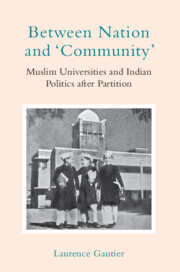Book contents
- Frontmatter
- Dedication
- Contents
- List of figures
- List of tables
- Acknowledgements
- A note on transliteration and translation
- List of abbreviations
- Introduction
- 1 A laboratory for composite India: Jamia Millia Islamia around the time of partition
- 2 Sifting Sir Syed’s legacy: From the ‘arsenal of Muslim India’ to a symbol of India’s national integration?
- 3 Re-legitimising minority rights: The campaign for Aligarh Muslim University’s minority status
- 4 Resisting minority politics, holding on to composite nationalism: Jamia Millia Islamia in the post-Nehruvian period
- 5 Uplifting backward Muslims: The new consensus?
- 6 Bastions of Islam: The defence of Islam as a narrative of empowerment and contestation
- 7 Women in Muslim universities: Guardians of tradition or actors of change?
- Conclusion
- Appendix
- Glossary
- Bibliography
- Index
3 - Re-legitimising minority rights: The campaign for Aligarh Muslim University’s minority status
Published online by Cambridge University Press: 15 April 2024
- Frontmatter
- Dedication
- Contents
- List of figures
- List of tables
- Acknowledgements
- A note on transliteration and translation
- List of abbreviations
- Introduction
- 1 A laboratory for composite India: Jamia Millia Islamia around the time of partition
- 2 Sifting Sir Syed’s legacy: From the ‘arsenal of Muslim India’ to a symbol of India’s national integration?
- 3 Re-legitimising minority rights: The campaign for Aligarh Muslim University’s minority status
- 4 Resisting minority politics, holding on to composite nationalism: Jamia Millia Islamia in the post-Nehruvian period
- 5 Uplifting backward Muslims: The new consensus?
- 6 Bastions of Islam: The defence of Islam as a narrative of empowerment and contestation
- 7 Women in Muslim universities: Guardians of tradition or actors of change?
- Conclusion
- Appendix
- Glossary
- Bibliography
- Index
Summary
I have promised the House that I will take every step to eradicate the communal and reactionary element in the Aligarh University.
—M. C. Chagla, education minister, to Gulzari Lal Nanda, home ministerThe problem of the Muslim University is not the problem of any particular group or organisation of the Muslims. It has become the problem of the entire Muslim community of India.
—Maulana Abul Lais, Jamaat-e-IslamiLate April 1965: A students’ protest escalates into a violent attack against Ali Yavar Jung, AMU's vice-chancellor. The very next day, the education minister, M. C. Chagla, announces the closure of the institution and the suspension of the University Act. He then swiftly passes an ordinance to extend government's control over AMU and to ‘eradicate’—he promises—‘the communal and reactionary element’ in the university.
Narrated in this way, the incident might appear to be the culmination of internal rivalries that unfolded after partition over the re-orientation of the university. Yet the controversies erupting at AMU did not remain confined to the university for very long. The adoption of the government's ordinance soon sparked an unprecedented wave of mobilisation, within and beyond the campus, which rapidly transformed into a large-scale campaign for the recognition of AMU's minority status. As the president of the Jamaat-e-Islami argued, the problem of the university quickly became, in the eyes of many university members and Muslim leaders, ‘the problem of the entire Muslim community of India’.
Mushirul Hasan regards the 1965 protests at AMU as a symptom of the sectarian passions that characterised the post-Nehruvian period. Like him, other scholars interpret the post-Nehruvian period as one of crisis—a crisis of the state's legitimacy and democracy, epitomised by the emergency, and a crisis of Indian secularism, symbolised by the rise of communal violence and the coming to power of the Hindu right in the 1990s. Sunil Khilnani, for instance, contrasts Nehru's supposed achievements—the establishment of a strong state and a stable social order—with the rise of political competition and the emergence of group-based demands in the latter period. He argues that this political competition encouraged politicians to resort, increasingly, to identity politics in order to mobilise their electorates. For him, this process of identity creation was dangerous as it often led to conflict, not just competition, thereby corrupting democratic principles.
- Type
- Chapter
- Information
- Between Nation and ‘Community'Muslim Universities and Indian Politics after Partition, pp. 137 - 188Publisher: Cambridge University PressPrint publication year: 2024

